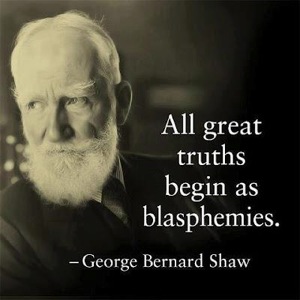
When we talk about blasphemy, the focus naturally goes to efforts by religious extremists to pass anti-blasphemy laws, criminalizing the criticism of their religion. It makes sense that this would be the focus since this sort of thing is antithetical to free expression and democracy.
It also makes sense that we, as atheists, would be particularly worried about the implications of such laws. We would likely be among the first targets of such laws. But as this image shows, there is a somewhat different way to think about blasphemy - as a term used by religious authorities to describe any teaching that goes against their doctrine.
The fact that our planet revolves around the sun instead of being the center of the universe was once considered blasphemy. One could be punished merely for suggesting the possibility. The fact that species evolve was once considered blasphemy (and still is throughout much of the American bible belt). From this perspective, blasphemy seems to be little more than what organized religion does not want you or I to know.
Suffrage and civil rights were once deemed blasphemous, affronts to what the church considered "sacred" and "holy." Interracial marriage was once deemed blasphemous because it was "unnatural" and "against god's will." We still see such hang-ups with same-sex marriage today by some religious extremists.
Accusations of blasphemy are about social control and the preservation of obsolete dogma. Cries of "blasphemy" and efforts to enact anti-blasphemy laws should be recognized for what they are: efforts to undermine reason and social justice.